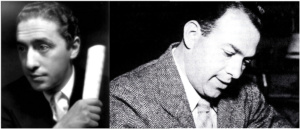Stories of Standards: “It’s Only a Paper Moon”
Tune in weekday mornings for Stories of Standards to hear our favorite versions of “It’s Only a Paper Moon.” Rodney Franks presents Stories of Standards Monday through Friday at 7:50 and 8:50 a.m. starting Monday, February, 17 for your listening pleasure!
Stories of Standards is sponsored by ListenUp
“It’s Only a Paper Moon” was written in 1932 by Harold Arlen, with lyrics by Yip Harburg and Billy Rose. Originally titled “If You Believed in Me” the public referred to it as “It’s Only a Paper Moon” and the title was changed. The 1932 play for which it was written (“The Great Magoo”) did not do well on Broadway; Claire Carleton gave the song its first performance in this on December 2, 1932. June Knight and Charles “Buddy” Rogers sang it in the 1933 movie “Take a Chance”, while Paul Whiteman recorded a hit version later that year. The song was revived during World War II, with hit recordings by Nat King Cole, Ella Fitzgerald and Benny Goodman. It is featured in the 1973 movie “Paper Moon”.
 Harold Arlen (Feb 15, 1905 – Apr 23, 1986) was born Hyman Arluck in Buffalo, New York and learned to play piano as a child. In his early twenties he moved to New York City, where he worked as an accompanist in vaudeville and changed his name to Harold Arlen. He composed his first hit “Get Happy” in 1929 with lyrics by Ted Koehler. The duo went on to write “Let’s Fall in Love” and “Stormy Weather” during the 1930s while writing for the Cotton Club. In the mid-1930s he began writing with Yip Harburg; the team was hired in 1938 by MGM to compose songs for “The Wizard of Oz”. In the 1940s he joined Johnny Mercer to write a series of hit songs. In all, Harold Arlen wrote more than 500 songs, including many of the best known and loved songs of the twentieth century.
Harold Arlen (Feb 15, 1905 – Apr 23, 1986) was born Hyman Arluck in Buffalo, New York and learned to play piano as a child. In his early twenties he moved to New York City, where he worked as an accompanist in vaudeville and changed his name to Harold Arlen. He composed his first hit “Get Happy” in 1929 with lyrics by Ted Koehler. The duo went on to write “Let’s Fall in Love” and “Stormy Weather” during the 1930s while writing for the Cotton Club. In the mid-1930s he began writing with Yip Harburg; the team was hired in 1938 by MGM to compose songs for “The Wizard of Oz”. In the 1940s he joined Johnny Mercer to write a series of hit songs. In all, Harold Arlen wrote more than 500 songs, including many of the best known and loved songs of the twentieth century.
Yip Harburg (Apr 8, 1896 – Mar 5, 1981) was born Isidore Hochberg on the Lower East Side of New York City. At Townsend Harris High School he bonded with Ira Gershwin over a shared appreciation of Gilbert and Sullivan. They both worked on the high school paper and became life-long friends. From Gilbert and George Bernard Shaw he learned “that ‘humor is an act of courage’ and dissent”. Introduced to Jay Gorney by Gershwin, he collaborated with Gorney on a series of Broadway musical revues, including the 1932 show “Americana” for which they wrote “Brother, Can You Spare a Dime”, with the tune from a lullaby Gorney had learned as a child in Russia. He was a member of the Socialist Party and unwilling to name members of the Communist Party for the House UnAmerican Activities Committee, which led to his being blacklisted from 1950 to 1962 and his passport revoked. This led to his return to Broadway where he wrote “Finnian’s Rainbow” with Burton Lane. He wrote two books of poetry “Rhymes for the Irreverent” (1965) and “At This Point in Rhyme” (1976).
This page: Harold Arlen (r) and Yip Harburg
Homepage: Yip Harburg (l) and Harold Arlen (r)
Become a Member
Join the growing family of people who believe that music is essential to our community. Your donation supports the work we do, the programs you count on, and the events you enjoy.
Download the App
Download KUVO's FREE app today! The KUVO Public Radio App allows you to take KUVO's music and news with you anywhere, anytime!